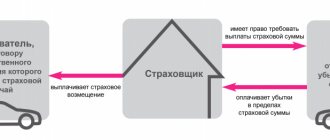Required documents
To terminate the MTPL agreement, you will need:
- Original policy
- Insurance contract
- Insurance payment receipt
- Passport of the policyholder, his representative or heir
- Power of attorney certified by a notary (for a representative)
- Bank account details (to receive payment by bank transfer)
Depending on the reason for refusal of MTPL, you will need additional documents:
- In the event of the death of the owner of the vehicle - a death certificate and a certificate or certificate of inheritance (for each heir)
- In case of complete loss of the car - a disposal certificate
- In case of sale - purchase and sale agreement, certificate of invoice, title with a note about the new owner
If necessary, the insurance company may request other documents and information. You can find out the full list from your insurer's support service.
When can you expect to receive a refund of part of your MTPL premium?
The vehicle owner has the right to terminate the current MTPL policy early, before the expiration of its validity period.
This right of the car owner is not limited in any way by law.
However, if the termination occurs simply at the will of the car owner, insurance companies have the legal right not to issue a refund of the unused portion of the insurance premium.
To this case we should add a number of situations when a refund of part of the payment under compulsory motor liability insurance is not made. These include:
- The MTPL agreement is terminated at the initiative of the insurance company on the basis of identified and confirmed information that the client, at the time of registration of the MTPL, provided false information affecting the cost of the policy.
For example, he slightly “improved” the experience of one of the drivers, adding a few extra years to him, or “made a mistake” in the engine power. As a result, the insurer incorrectly assessed the degree of risk and calculated a lower cost for the compulsory motor liability insurance policy.
- Cancellation of the MTPL policy due to a long period of non-use of the car.
For example, a car owner is planning a six-month business trip to the North and will not drive a car during this period. As a rule, the policyholder’s application for a refund of part of the insurance premium in such a situation is refused.
- Another situation is related to cases of liquidation of an insurance company. The practice here is that if a company has filed for bankruptcy or its license to carry out compulsory civil liability insurance has been revoked, then the probability of getting back part of the funds paid for the compulsory motor liability insurance policy tends to zero.
Above we have listed situations when a car owner who wants to terminate an MTPL policy with a refund of the insurance premium is refused.
Now let's look at situations where the car owner has the full legal right to receive part of the unused premium.
- Loss of a car. If the likelihood of insured events occurring under the MTPL policy has ceased due to the loss or destruction of the car (theft, constructive loss, disposal), the owner may qualify for a refund of part of the premium.
- Change of owner. If the car is sold to a new owner under a purchase and sale agreement, the MTPL policy can be terminated with a refund.
By the way, when selling a car, you can reissue the MTPL policy to the new owner, including the cost of the policy in the total price of the transaction. This is done by submitting an application to the insurance company accompanied by a purchase and sale agreement.
- Death of the owner. In this situation, termination of the MTPL agreement with a refund is allowed.
- Death of the policyholder. This situation is similar to the previous one, but is accompanied by large time delays. Because only legal heirs, who enter into the right of inheritance only approximately 6 months after death, will be able to apply for termination.
- Liquidation of the owner-legal entity. In the event that a legal entity owning a car, the MTPL agreement is terminated with the calculation and return of part of the premium.
Refund amount = (Insurance premium - 23%) x N/12
N is the unused contract period in months,
23% is the amount of the insurer's deduction.
There is still no clear legal position regarding the deduction of part of the premium in the amount of 23% of the actual payment.
According to the recommendations of the Russian Union of Auto Insurers, insurance companies withhold this share from payments of policyholders. The logic is this:
- 3% are contributions from insurance companies to various RSA funds,
- 20% are the costs of the insurance companies themselves for concluding and maintaining compulsory motor liability insurance policies.
However, there are a large number of court decisions in which car owners who disagree with the 23% withholding successfully challenged the actions of insurers and recovered the full amount of unused premium in their favor.
Depending on the grounds for which the MTPL policy is terminated, the final recipient may also change the amount of the refund.
So, the following can receive the unused portion of the bonus:
- Policyholder,
- Legal heirs of the policyholder (in case of his death),
- Car owner,
- Legal heirs of the owner (in case of his death),
- Representatives of the owner of the car, whose powers are confirmed in the manner prescribed by law (most often this is a formalized general power of attorney).
According to paragraph 34 of the current MTPL insurance rules, the insurer is obliged to carry out the termination within 14 calendar days from the date following the date the insurer receives the termination application.
The return format may vary, depending on the financial policy of the insurance company.
A number of companies refund part of the MTPL premium in cash through the cash register. Sometimes even immediately on the day of treatment.
Other insurers prefer cashless transfer to the details specified in the termination application. In this case, you should prepare in advance and take with you the bank details of your card or current account before visiting the insurer’s office.
In order to terminate an MTPL policy early and subsequently return the unused portion of the premium, the policyholder must present a number of documents to the insurer.
First of all this:
- MTPL policy or a copy thereof,
- receipt for payment of the MTPL policy,
- policyholder's passport.
We invite you to read: Directors do not pay salaries under the contract
In addition to these, the insurance company may request documents such as:
- car purchase and sale agreement,
- general power of attorney,
- document confirming inheritance rights,
- death certificate of the policyholder or owner,
- documents on liquidation of the owner-legal entity.
If the MTPL agreement is terminated early, the accident-free history for less than a full year is not taken into account when calculating the CMR.
What does this mean for drivers?
Careful driving and the absence of accidents for the partial period in which the terminated policy was in effect will not give the driver an additional discount for accident-free driving.
Its bonus-malus ratio will remain at the level of a year ago.
Therefore, in situations where there is a desire to terminate the MTPL policy a month before its expiration, it makes sense not to do so. In this case, the KBM will be improved by another 5%, and the cost of the MTPL policy will decrease even more in the future.
Cancellation of a comprehensive insurance policy
Law on compulsory motor liability insurance, insurance rules and other regulations
There are several reasons for terminating an insurance contract due to the following circumstances:
- expiration of this document (clause 3 of Article 425 of the Civil Code of the Russian Federation);
- the emergence of mutual consent of the parties, if this does not contradict the rules established by law or agreement (clause 1 of Article 450 of the Civil Code of the Russian Federation);
- by a court decision if there is a demand from one of the parties in respect of which the conditions established by the agreement or the requirements of the current legislation were significantly violated (clause 2 of Article 450 of the Civil Code of the Russian Federation);
- the disappearance of the likelihood of an insured event and insurance risks on grounds other than the insured event (clause 1 of Article 958 of the Civil Code of the Russian Federation);
- a voluntary decision of the policyholder (or beneficiary) to refuse to continue the insurance contract (clause 2 of Article 958 of the Civil Code of the Russian Federation).
A situation that meets paragraph 1 of Art. 958 of the Civil Code of the Russian Federation (disappearance of the probability of an insured event and insurance risks), may arise if:
- the property in respect of which the insurance contract was drawn up was lost, but not due to an event regarded as insurable;
- the activity of the policyholder in respect of which the insurance contract was drawn up has ceased;
- other circumstances have arisen that correspond to the condition that the probability of an insured event and insured risks disappearing, but are not regarded as an insured event.
This kind of other circumstance for the purposes of paragraph 1 of Art. 958 of the Civil Code of the Russian Federation will be, for example, the fact of early payment of a mortgage loan, the receipt of which was accompanied by the execution of an insurance contract.
To learn about the conditions under which premiums are returned under CASCO and MTPL contracts, read the article “Insurance premium is...”.
Insurance premium return situations arise when the contract is terminated:
- by mutual agreement of its parties - in this case, the insurer and the policyholder have the right to make an agreed decision on the return of part of the premium, enshrining this in the text of an additional agreement to the contract or a document on its termination, if the text of the contract initially did not contain such a condition;
- by decision of a judicial authority - here the issue of return (non-return) of part of the premium will be decided by the court;
- in connection with the disappearance of the likelihood of an insured event and insurance risks on grounds other than the insured event, this situation obliges the insurer to return part of the premium attributable to the period during which the insurance contract was unclaimed (clause 3 of Article 958 of the Civil Code of the Russian Federation );
- according to a voluntary decision made by the policyholder (or beneficiary) - here the obligation to return part of the premium can arise only when the terms of the contract provide for it (clause 3 of Article 958 of the Civil Code of the Russian Federation).
Signing an additional document to return part of the insurance premium may be necessary if such a possibility was not initially included in the text of the contract, and the contract is terminated either by mutual decision or by a voluntary decision of the policyholder (beneficiary). In practice, the second option (with a voluntary decision of the policyholder) actually does not work, since insurers do not agree to draw up such a document, preferring to use their right to refuse to return the premium if the policyholder (beneficiary) decides to terminate the insurance contract voluntarily (p 3, Article 958 of the Civil Code of the Russian Federation).
Thus, as a rule, it is not necessary to draw up an additional agreement or any other document in connection with the issue of returning the premium to the insurance contract. But in cases requiring the return of the premium (clauses 1, 2 of Article 958 of the Civil Code of the Russian Federation), the insurer will need to submit:
- an application requesting the return of part of the insurance premium;
- documents confirming that the conditions created for termination of the contract correspond to the return situation that is either required by law or provided for in the contract.
How does termination occur?
You can terminate a compulsory motor liability insurance contract, including one executed online, only at the office of the insurance company. The law does not provide for an option in which you can cancel such insurance via the Internet. Therefore, in any case, you will have to contact the insurer’s branch - check in advance which office can do this.
To terminate compulsory motor liability insurance, contact the insurer's office with all the required documents and fill out an application. It must indicate the reason for termination of the contract and information confirming it. It is not necessary to print out an electronic policy, but it is advisable: most insurers require a paper version of the document in hand.
The company will consider the application for termination of compulsory motor liability insurance within a few days. If the grounds for refusal are confirmed, the company will cancel the contract and return a share of the insurance premium.
Where to contact
You should, of course, contact your strass company from which you purchased the policy and whose stamp is on its letterhead.
First, you can call the insurance company to clarify the list of documents that you will need to collect. After that, you go to the insurance company’s office to cancel the deal.
If you need to file a complaint against an insurer who refuses to accrue payments to you, then this can be done by filing complaints with the following authorities:
- Bank of Russia;
- Society for the Protection of Consumer Rights;
- AIS RSA;
- judicial institutions;
- FAS.
The Bank of Russia has the right not only to set tariffs at basic rates for the cost of compulsory motor liability insurance policies for insurance companies, but also to regulate their activities.
The Central Bank has the right to take away the license of an insurer that has violated the law, or to impose a moratorium on its activities. RSA is the Russian Union of Auto Insurers, which is also authorized to initiate a procedure for liquidating an insurance company or suspending its activities with the seizure of licenses.
The FAS, the Federal Antimonopoly Service, has almost the same influence.
Refund for electronic insurance
If you refuse compulsory motor liability insurance, you have the right to return part of the paid contributions. The balance is calculated for the entire time during which the policy was issued. From this amount, the insurer additionally withholds a commission of 23%. This amount includes the insurance company's fee (20%) and deduction to the RSA (3%). The transfer of money will take 1-4 days after termination of the contract.
Depending on the reason for refusing OSAGO, the money will be transferred:
- To the car owner
- To the heir of the deceased policyholder
- To the policyholder, if he is the owner of the car
- To the policyholder, if he acts under a power of attorney from the owner of the car
If the policyholder has several heirs, the payment is divided into parts in accordance with the shares in the inheritance.
If payment is not received within the specified period, then contact the company office as soon as possible to find out the reason. As a last resort, you can contact the RSA or demand a trial. Prepare copies of the policy and application in advance - they will serve as evidence of the insurer’s obligations to you.
Refund procedure
https://www.youtube.com/watch?v=ytpress
In accordance with the rules of MTPL insurance, the following categories of persons can receive money:
- owner of the vehicle;
- the policyholder under a power of attorney from the owner to receive funds from the insurance company;
- heirs of the owner/policyholder;
- their representatives by proxy.
The unexpired period is calculated from the date of filing the application if there was a refund of compulsory motor liability insurance upon sale of the car. In other cases (death or liquidation of the owner, revocation of an insurance company's license, destruction of a vehicle), time starts from the occurrence of the event.
In turn, the funds to be returned to the policyholder can be paid as follows:
- in cash through the cash desk at the UK branch;
- to the bank account of the owner - an individual or legal entity.
The application is considered within 14 days. This is the period within which the insurance company is obliged to close the contract and pay the remaining funds.
The law provides for the driver’s ability to refuse voluntary insurance (including CASCO, DSAGO, etc.) without giving reasons within five days after issuing the policy. The bonus upon termination of the contract during this so-called “cooling off period” is returned to the citizen 100 percent.
This rule does not apply to MTPL. Nevertheless, it can be used in situations where enterprising insurance company managers do not agree to issue compulsory insurance without a “load”. Immediately after purchasing MTPL, without leaving the office, the car owner has the right to issue a waiver of unnecessary imposed policies. The money will be refunded in full within 10 days.
The refusal of the insurance company to close the MTPL agreement at the client’s initiative can be caused by various reasons. Here are the most common ones:
- the package of documents turned out to be incomplete;
- Insurance payments were made under the MTPL insurance contract.
The law establishes an exhaustive list of documents that an insurer may request from its client. But in an effort to protect themselves, insurance companies require additional ones, for example, a copy of the PTS with the new owner written on it as confirmation of the completed sale. Providing these papers is a citizen’s right. If the insurance company refuses to pay money based on the lack of optional documents, this can be challenged in court.
The law does not establish other rules for early termination of compulsory motor liability insurance and payment of the remaining premium in the event of losses. If the actions of the insurance company are clearly unlawful, a citizen can defend his rights in pre-trial proceedings, by complaining to the management of the insurer, to the RSA or to the Central Bank, as the main regulator of the insurance business in Russia.
A lawsuit is the most effective measure if claims do not help. In court, you can not only achieve payment in full, but also count on a penalty in the amount of 1% of the total amount for each overdue day, and even compensation for moral damage.
Policy expiration date
The policy ceases to be valid the very next day from the date of application. If you contact the insurance company too late, the amount of compensation will be minimal. Therefore, if there is little time left until the end of the policy, it is more advisable to wait until the end of the contract and not renew it.
When selling a car, the date of termination of compulsory motor liability insurance will be the date of filing the application. In the event of the death of the policyholder or the disposal of the car, the date of termination will be considered the date of occurrence of this event.
Pre-trial procedure
To return part of the insurance premium or all insurance, you must first contact the company’s office. If the policyholder has a valid claim, the insurer is unlikely to unreasonably refuse to accept a claim.
When applying for pre-trial settlement of the issue, you should bring all documents related to the policy:
- Insurance contract.
- Policy (if issued separately).
- Payment receipts (receipts, payment orders, account statements from which money was transferred to the insurance company).
- Passport.
- An account for transferring previously paid premiums.
- Statement.
Before determining what is the procedure for terminating a compulsory motor liability insurance contract on the part of an insurance company client, a few words should be said about the timing of termination.
This is important here because the amount for the return of the insurance premium to the client will be calculated not from the date of sale of the car, but from the day the owner of the MTPL insurance policy submits an application.
The entire period between the date of sale and the date of filing the application will not be taken into account, and the insurer will not accrue money to the policyholder for this period.
It’s a different matter if we are not talking about a transaction for the sale and purchase of an insured car, but about the death of the car owner.
In this case, insurance premiums to be returned to the relatives of the deceased policyholder will be calculated from the date of his death, and not from the date of filing the application.
Therefore, under such sad circumstances, there is no need to rush into filing an application for payment of insurance premiums under the policy.
Applications will be accepted for consideration from the following persons:
- the car owner in whose name the policy is issued;
- authorized by a power of attorney executed by a notary to represent the interests of the car owner;
- a relative of the deceased car owner, who is his heir after his death.
The procedure for submitting an application, the procedure for terminating the agreement and calculating payments for compulsory motor liability insurance are as follows:
- Call the insurance company to clarify the package of documents required to properly terminate the contract.
- Come to the office with all papers and copies prepared in advance.
- Write a statement asking to terminate the insurance agreement, as well as to make all necessary insurance payments.
- You are waiting for a response from the insurer, which cannot take more than 15-20 days.
- Upon receiving a positive response, you expect a transfer to your account specified earlier in the application of the amount of insurance premiums that are due in such cases to be paid to the policyholders.
You should pay attention to one more detail - you should not give away all copies of the documents used to start the procedure for terminating the contract, without keeping copies for yourself.
You definitely need to keep a copy of the application and a copy of the policy under which the contract is being terminated.
We invite you to familiarize yourself with: The nuances of paying a tax deduction and the deadlines after filing an application
This is extremely necessary in case the insurance company refuses to pay you (since it cannot refuse to terminate the contract by law).
You should also note important information about the timing of how soon payments should be credited to the account after the termination of the insurance contract.
In practice, transfers are usually made by the insurer immediately in the office if it is most convenient for him to pay in cash rather than transfer to the policyholder’s account.
Then, in this case, at least 2 weeks will pass until all the required amounts arrive in the client’s account.
Can they refuse to terminate or pay money?
The insurance company can refuse payment only in certain cases:
- Providing false information when applying for compulsory motor liability insurance
- The insurance was issued in installments, but the next required payment was not received in the company's bank account
- If the reason is the inability and unwillingness to use the car for a long time
- Insurance company bankruptcy
- The insurance taken out was temporary - for delivery of the vehicle to the place of registration
What to do if refused
If the amounts did not arrive on time, although the insurer accepted the application for termination of the contract along with all the documents attached to it, then we are talking about the insurance company’s refusal to pay the client the required amounts.
It’s just that the insurer didn’t even consider it necessary to write to the client about this or notify him of the refusal. In this case, the matter should be resolved no other way than through the courts.
Therefore, to the question of what to do if the insurer refuses to return part of the insurance, the answer is as follows:
- First submit a claim to the head of the insurer. One copy of the claim must remain in your hands with certified details of the incoming document from the office of the insurance company.
- Receive a response from him within 20 days.
- If the answer is again refused, then write a statement of claim to the court, attaching to it:
- a copy of the claim;
- a copy of the statement that you previously filed for termination of the contract with the right to receive payments;
- copy of the MTPL policy.
- You can also write a complaint against the insurance company to the RSA, the Bank of Russia, or to the FAS or the Society for the Protection of Consumer Rights.
When filing a complaint with the appropriate authority, the client has the right to receive compensation payments in the form of a penalty in the amount of 50% of the total amount of insurance, which is due by law to be credited to the policyholder’s account.
The most typical reasons for refusal:
- early loan repayment;
- desire to save on policies;
- failure to pay the next insurance payment;
- termination of the contract by the insurer itself;
- transferring insurance to another insurance company.
Early termination of the insurance contract unilaterally by the insurer (clause 3 of Article 450 of the Civil Code of the Russian Federation) occurs mainly in the event of failure by the policyholder to pay the next installment of the insurance premium. In this case, the contract will be considered terminated 30 calendar days from the date of sending the relevant notice to the client.
In the event of early termination of the insurance contract at the request of the policyholder, the other party must be notified in writing no later than 30 days before the date of proposed termination. In the event of early termination of the contract due to non-payment, at the request of the client or by agreement of the parties, the insurer pays the redemption amount within the limits of the insurance reserve formed in accordance with the established procedure on the day of termination of the insurance contract (redemption amount).
Questions and answers
Is it possible to terminate a compulsory motor liability insurance contract at your own request?
The law allows for the termination of a compulsory motor liability insurance contract for other reasons not included in the official list. However, insurance companies rarely allow you to refuse such insurance at your own request. Attempts to appeal such refusals in court, as a rule, end not in favor of the policyholder.
Is it possible to return money for compulsory motor liability insurance if insured events have previously occurred under it?
Yes, the presence of insurance cases under compulsory motor liability insurance and their number do not in any way affect the return of money if you cancel this insurance. The insurance company is obliged to reimburse the premiums you have paid depending on the period that has passed since the date of registration of the policy.
The insurance company reduced the payment amount without explanation, what should I do?
The procedure for reimbursement of payments under compulsory motor liability insurance and the amount of reimbursed amounts are regulated by law. If the insurer underestimates the amount of this amount, appeal its actions to a higher organization or go to court.
Reasons and conditions for termination of the insurance contract
Termination of the MTPL contract is the same early termination of the insurance agreement that is mentioned in the articles of the law “On MTPL” (hereinafter referred to as the Law), which is carried out at the request of the policyholder.
Each car owner who has entered into such an agreement with one or another insurance company can, if necessary, terminate such an agreement for any reason.
Various situations may arise, due to which you will have to begin formalizing the termination of relations with the insurance company.
We invite you to familiarize yourself with: Limitation period for debts of individuals
The main reasons why a client may want to unilaterally terminate the contract are as follows:
- There was a purchase and sale transaction for a vehicle, after which the car had a new owner.
- The unsuitability of a vehicle is classified as “total loss of the vehicle” after an accident, or the vehicle is old in age, cannot be legally operated and is subject to immediate disposal.
- The owner of the car has died and this is confirmed by the death certificate of the car owner issued by the relevant government services (RAGS of the Russian Federation).
- Bankruptcy of an insurance organization, which no longer provides any prospects for it to carry out its activities and fulfill its obligations under the MTPL agreement concluded with the client.
- If the policyholder is a legal entity and is undergoing the process of liquidation of the enterprise, then he also has the right to terminate the insurance contract in the direction of compulsory motor liability insurance, if such agreements were in place for the enterprise at the time the liquidation procedure was launched.
- The activities of the insurance company are undergoing a judicial procedure, or its license to issue compulsory motor liability insurance policies has been revoked, and it now does not have the right to engage in insurance in this area and fulfill its obligations stipulated in the contract.
- Any other cases that appear in the text of the Law.
You just need to remember that from this amount, which is to be transferred to the policyholder’s account, the insurance organization will also deduct 23%, which is necessary to cover organizational expenses.
So, 20% is the cost of drawing up an insurance agreement with a client, and 3% is a mandatory fee that all insurers make to the RSA Fund.
Therefore, when determining the amount of money the client will have to receive after terminating the MTPL agreement, this factor should also be taken into account.
Sources
- Official website of Renaissance Insurance
- RSA official website
Recommended for you
- How is the loss of marketable value of a car considered under compulsory motor liability insurance?
- Do you need a compulsory motor liability insurance policy to register a car?
- How to change rights in the MTPL policy
Vitalina Slepukhova One of the leading journalists of the project. In the credit sector since 2008. Has a higher education with a degree in Banking. Published in the online edition of the Kommersant newspaper. Extensive experience in the financial sector helps to navigate the microfinance and banking services market and see the most important events.
(11 ratings, average: 4.7 out of 5)








